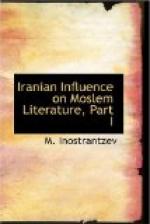And I have read in the Taj; Said Aberwez to his son Shiruya who had put him into prison, [and here follow some views relating to the treatment of soldiers.]
And in one of the Books of the Persians it is stated that Ardeshir said to his son, “Oh, my son, the empire and the religion are two brothers which cannot do the one without the other. For the religion is the foundation and the empire is the guardian and whatever has no foundation falls and whatever has no guardian to look after it goes to waste” [And then proceeds to advise him as to the treatment of the nobles, warriors, the clergy, etc. Then are described the five qualities essential in a man occupying a post in the imperial government]
And it is said in the Taj that Aberwez wrote to his son Shiruya from his prison.... (p. 20)
And I have read in the letter ... Aberwez wrote to his son Shiruya, [and here follow instructions regarding the three qualifications necessary in a revenue officer.] (p. 21)
[Sidenote: The Taj.]
I have read in the Taj that one of the kings of Persia took counsel with his Wazirs, [and here follows a discussion about the necessity of confiding one’s secret to one man only and not more.] (p. 25)
[Sidenote: Epistle of Aberwez.]
I have read in the Epistle of Aberwez to his son Shiruya who was imprisoned by him,[here follows the advisability of taking counsel with a certain class of people.] (p. 30).
[Sidenote: Marzbans.]
One of the kings of Persia, when he consulted the Marzbans and they did not give their opinion in a proper way, summoned those who were entrusted with provisioning the Marzbans and punished them. The latter complained that the error was on the part of the Marzbans whereas the punishment was awarded to them and the king replied that was so, and that the Marzbans would not have committed the error unless their minds were not dependent upon their food.
[Sidenote: Buzurjamaher.]
[Sidenote: Books of the Persians.]
[Sidenote: Ideal Persian Secretary]
Says Buzurjamaher, “When you are in doubt as to the propriety of doing one of two things then look out for the one which is nearest to your desires and relinquish it.” (p. 23). And it is said in the Books of the Persians, [and here follows one of the most frequently repeated injunctions about the strict guarding of one’s secrets.] (p. 40.) The Persians were in the habit of saying that the person would be deficient as a writer who was not conversant with the nature of flowing waters, with the digging of canals, with mirage, with the length of days as to particular seasons, with the rising of the new moon, and its effects, with weights and measures, with mensuration, triangles, squares, and measurements of areas involving various angles, with the preparation of channels and bridges and water mills, with the implements of artisans, and with the intricacies of mathematics. (p. 43).




